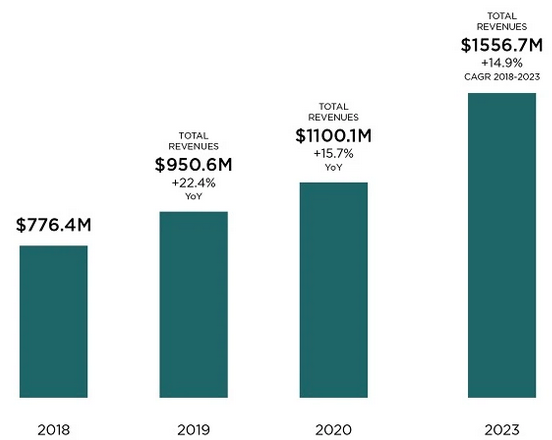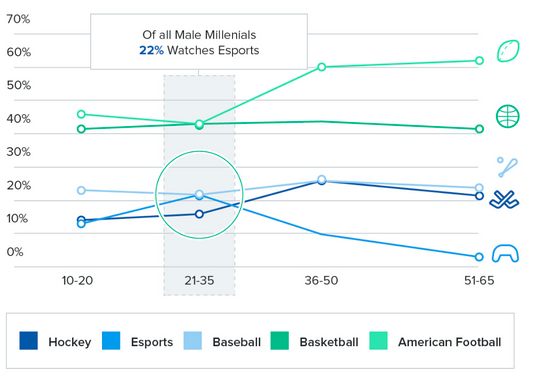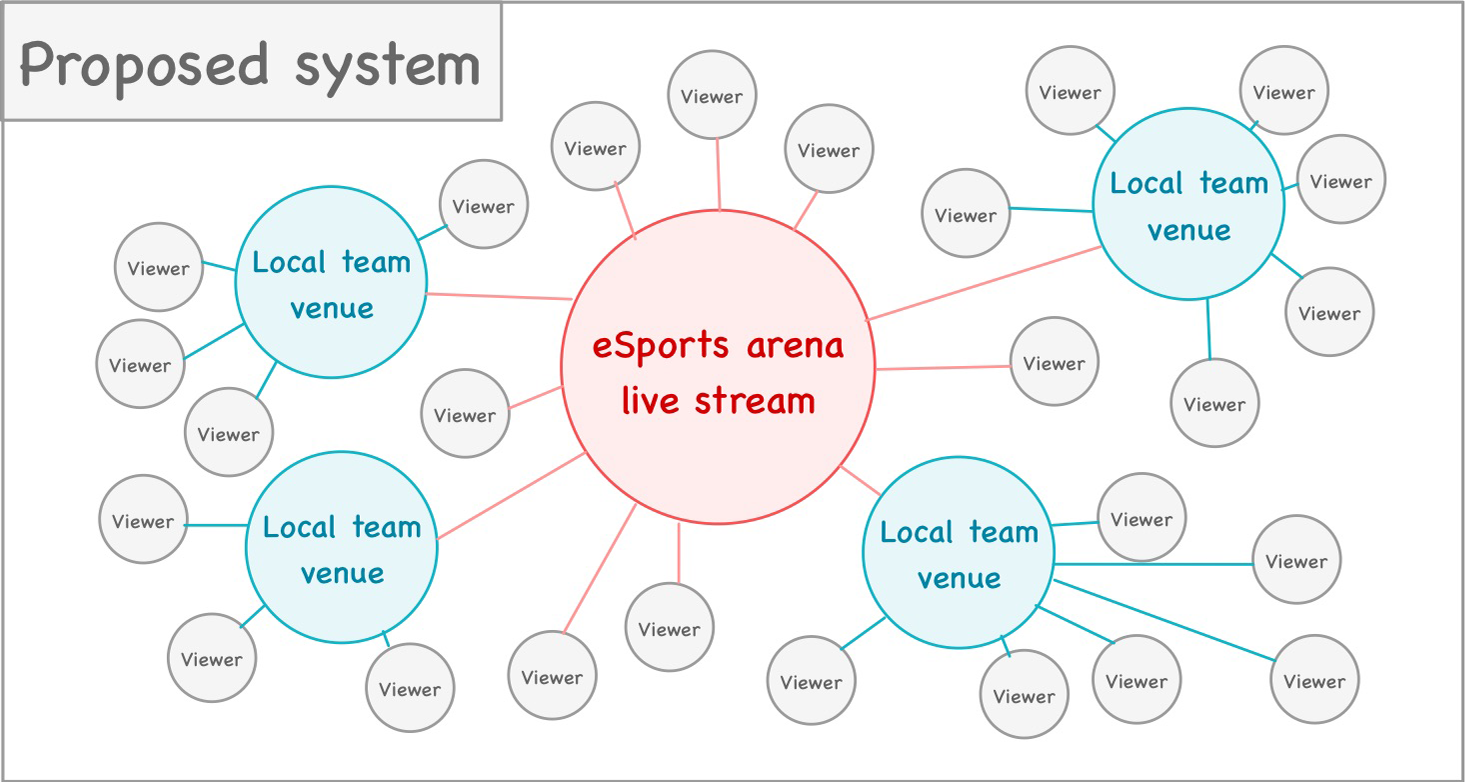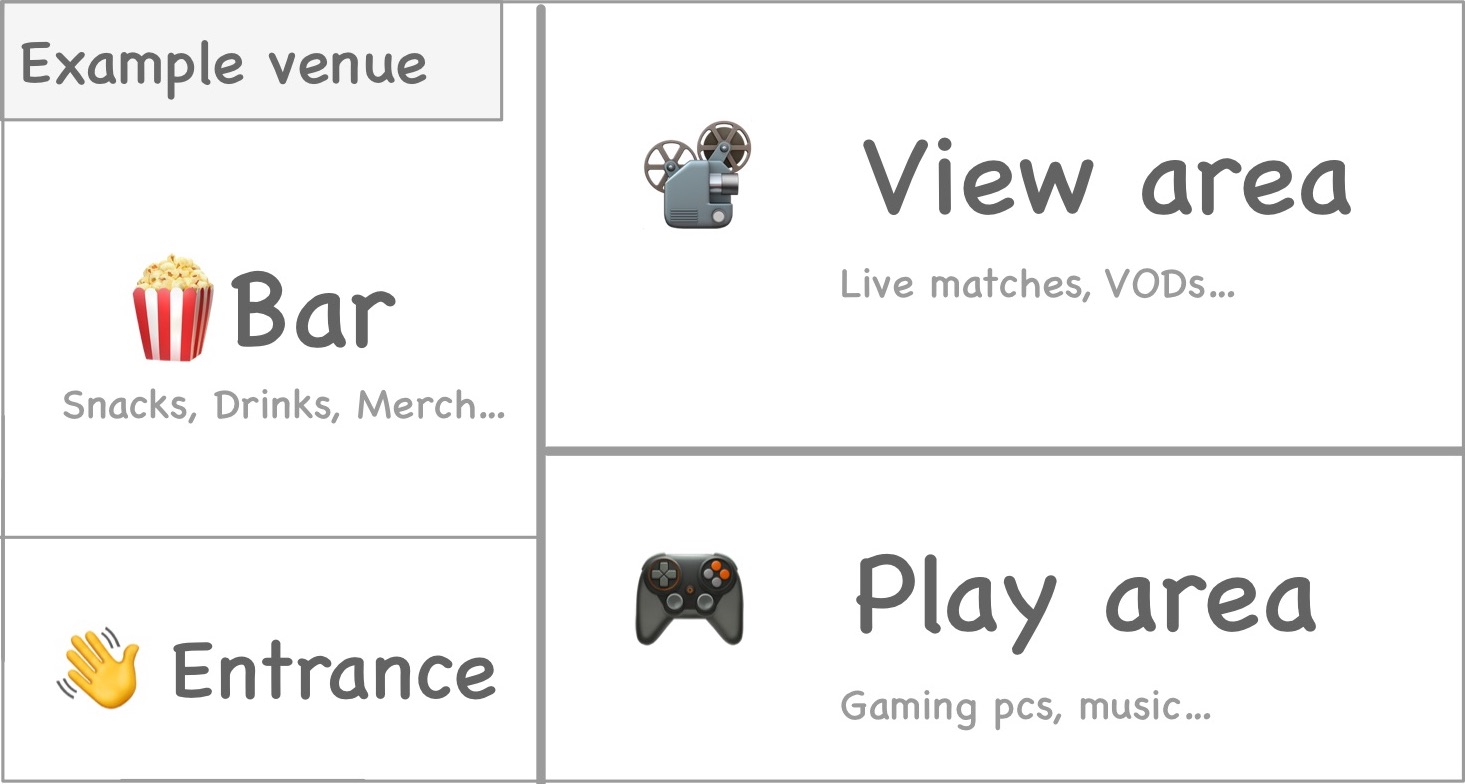An idea - Local eSports team venues
Why?
The growth of eSports has been tremendous over the last years and is expected to continue on in the future1, rivaling the population of traditional sports2.



Unfortunately, eSports events in the real world could not keep up with this rapid growth, making eSports a phenomenon that primarily exists on the internet. Therein lies a problem: fans have little incentive to bond with a particular team because they lack in physical presence. This might hamper engagement levels.
However, now is a great opportunity to fix this problem: COVID-19 has had dramatic effects on traditional sports3 and the value of real estate4, but not so much on eSports1. Within the imminent return to local event lies the unique chance for the eSports industry to build up a presence in the physical world, making the sport more tangible and teams more personal.
Solutions
Naïve approach
An example of a naïve way to go about this problem is what Activision Blizzard did with their Overwatch League:
Instead of using the decentralized fan base and highly scalable nature of eSports for their advantage, they committed every team to hosting ‘a series of matches in their respective cities’5. This imitation of the classic sports model requires eSports teams, which are typically not tied to specific cities, to unnecessarily roam around distant locations, instead of simply playing at a single standard arena (e.g. League of Legends LCS arena).
This approach does not fix the problem of local absence. Yes, having one arena per team is better than just one for all, but the number of total locations is still way too low to make visiting an eSports match a viable alternative to visiting e.g. a game of soccer.
Proposed approach
I see the primary advantages of eSports over classic sports in its high scalability and decentralized fan base, which is both made possible because of one thing: Online live streaming. Currently, most eSports matches are being live streamed on Twitch/YouTube and then consumed by individual viewers from their homes.
My suggestion for improving this status quo is to build team branded eSports venues, which serve as local hubs to view and play video games. You can think of it as a mix between cinema and internet cafe, owned and operated by an eSports organization or a licensed third party. Team venues would function as nodes, connecting the widespread fans at specific, team branded locations in the physical world.


Areas
These team venues would comprise three principal areas:
📽 View area
The view area offers one or multiple theaters in which eSports matches are being streamed over the internet onto a big screen. The program consists of live/recorded eSports matches, focusing specially on matches from the hosting org.
🕹 Play area
The play area offers an array of gaming pcs, where visitors can play with others (like the super popular PC-Bangs in South Korea). This allows visitors to form new connections under the banner of a team, while also serving as a fallback option when no matches in the view area are currently taking place. Alternatively, it could also host local tournaments, which then can be viewed directly in the view area.
🍿 Bar area
Finally, there should, of course, also be an area where visitors can purchase snacks/drinks/merch etc. to enhance their stay at the venue.

Advantages
👥 For visitors:
-
viewing an eSports match becomes a social event (like watching e.g. a soccer game)
-
local communities can form organically around teams and games
-
teams become tangible → stronger bonding
-
new viewers can get introduced to eSports (teams) more easily
-
local hub for gaming → new social connections with other eSports enthusiasts
-
unique viewing experience in showrooms built specially for viewing eSports matches
🏆 For eSports organizations:
-
the org becomes ‘the face’ of eSports in the city they open a venue in → brand recognition
-
local presence and strong bonding with the community → more engagement
-
identify and recruit new talent
-
more legitimacy for eSports as a whole
-
teams don’t have to travel to distant locations (like in the OWL approach)
-
monetization either through franchising or operating venues
💼 For operators:
-
growing, untapped market of customers with strong purchasing power6
-
strong, versatile source of income
-
entry fees, snacks
-
branding of equipment
-
merch sales
-
…
-
-
franchise model allows operators to use an existing brand instead of having to build one themselves
-
highly scalable (compared to the OWL model described above)
Pricing model
Since eSports matches are usually free to watch over the internet, I would suggest keeping the entry fee to the view area also free in order to attract potential customers. A decently sized crowd is critical for providing a great viewing experience, as there is no major benefit in viewing a match alone in the venue. Revenue would mostly come from the bar/play areas, sponsorships, and branded equipment.
Further ways of monetization like a subscription model that provides free entry/play quotas as well as exclusive content like e.g. pro guides could also offer a great deal for all parties involved, be it visitor, org or operator.
End note
This pitch is merely a sketch of what the next generation of eSports could look like. In my opinion, eSports move to the physical world is long overdue and one of the industry’s biggest challenge to overcome. However, with the concept of local eSports team venues, as well as the currently favorable market conditions, I am convinced this is an idea worth exploring further. The motivation behind this post is my personal desire for such a venue. Here, in Germany, there are currently no (or far too few) places gamers and eSports enthusiasts can go to enjoy their passion with others. It simply astonishes me, that the gaming industry, which is worth billions, offers such limited options.
If you want to contact me or have further matters, you would like to discuss with me, you can do so here: [[About & Contact#Contact|💬 About & Contact#Contact]]